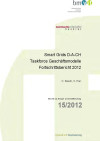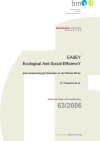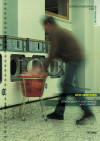Suchergebnisse für "Factsheet: Energietechnologien gestalten, die für alle sinnvoll und nutzbar sind"
BIGMODERN - Subproject 5: Feasibility studies about innovative technical solutions
The application of innovative technologies means additional planning and coordination effort which usually cannot be incorporated into the conventional planning processes of the BIG. To overcome these barriers for the application of innovative technologies, the sub project at hand aims at preparing information, feasibility studies, planning records, experiences and practical examples in a way, that they can be implemented directly into the planning process.
G2G – Innovation axis Graz-Gleisdorf
Development of testbeds and demonstration zones within already designated areas for urban development along the Graz-Gleisdorf Innovation-Axis with a focus on energy, integrated building technology, smart city-spaces, compact settlement structures, generational living, and ‘cities of short ways’. It will pay specific attention to intermodal mobility as well as ICT-based solutions.
DIM4Energy - Digital Information Models for the Planning and Optimization of Buildings and Urban Energy Infrastructure
Digital information models (DIM) are playing an increasingly important role in urban planning and decision-making processes, from individual buildings (BIM) to urban information models (UIM). For the planning and optimal operation of plus-energy neighborhoods, valuable information could be obtained from these existing models, provided the appropriate data sources and associated software tools are properly linked.
fit4power2heat
The integration of heat pumps can increase the cost effectiveness of existing heating networks and counter the high costs for the expansion of power grids at the same time. Aim of the project is to develop innovative business models for small and medium municipal heating networks with focus on synergies between heat and power market. Main focus is a heat pump pooling for several heat grids.
ThermoCluster - Heat generation from infrastructure projects and integration into decentralised low-temperature heating and cooling networks for plus-energy districts
Integrative assessment of the geothermal potential of the Brenner base tunnel and the northern portal area, and the subsequent distribution of the heat generated from these sources to the end-consumer in potential plus-energy districts of the city of Innsbruck.
Technological as well as economical optimized Biomass CHP systems with regard to state-of-the-art technologies.
Analysis and presentation of representative biomass CHP systems with an electric power output of less than 2 MW. Variation of parameters and identification of potential optimized interactions between specific units. Identification of the economically and thermodynamically most optimized interconnection based on state-of-the-art technologies.
Valuation models for future energy clusters considering market, technology and policy uncertainty - Case Study Biomass
Market liberalization, technological change and increasing complexity of international policy processes (e .g. climate negotiations) necessitate new approaches to evaluating investments in an uncertainty and risk-augmented framework. This project developed valuation methods from financial theory - such as real options valuation and portfolio optimization - to quantify the relative competitiveness of bioenergy chains and total energy systems.
Housing 4.0 - digital platform for affordable living
The main aim of this project is the development of an integrated framework for the digital platform "Housing 4.0"; thus supporting integrated planning and project delivery through coupling various digital tools and databases. Thereby, the potentials of BIM for modular, off-site housing assembly in order to improve planning and construction processes, reduce cost and construction time and allow for mass customization will be explored. The novel approach in this project is user-involvement; which has been neglected in recent national and international projects on off-site, modular construction, supported by digital technologies.
Smart Grids D-A-CH Taskforce Geschäftsmodelle

Fortschrittsbericht 2012
Schriftenreihe
15/2012
C. Resch, C. Pier
Herausgeber: BMVIT
Deutsch, 96 Seiten
Downloads zur Publikation
Film "Bauen mit Hausverstand - Das Haus der Zukunft"
Das "Haus der Zukunft" - Dokumentation über ambitionierte Pilotprojekte Jetzt mit DVD-Bestellmöglichkeit!
EASEY - Ecological And Social EfficiencY

eine Anwendung als Subindex an der Wiener Börse
Schriftenreihe
63/2006
R. Paulesich et al.
Herausgeber: BMVIT
Deutsch, 112 Seiten
Downloads zur Publikation
CityStore - Sondierung des wesentlichen F&E-Bedarfs zur Optimierung von städtischen Energiespeichern in integrierten Energiesystemen
CityStore pursues a first-of-its-kind, innovative approach on spatial location of storage needs and potentials. This includes the evaluation of concrete challenges and prerequisites as well as the identification of useful storage technologies and capacities. Model calculations for the model cities Graz and Weiz will be carried out. If, and to which extent, the results can be generalized will be investigated in the Follower Region South Burgenland. The results should enable optimized planning and realization of urban energy storage facilities – thereby enabling targeted investments in energy infrastructure to achieve (local) climate and energy targets.
BIGMODERN - Subproject 2: Demonstration project of an official building in Bruck
In the frame of this subproject being part of the flagship project BIGMODERN, a decision matrix as well as a handbook for planning, including feasibility analysis and a collection of information, serving as decision guidance for planning and implementation of sustainable building refurbishment, is being developed. In this way, the risk for planners and builders of the usage of new sustainable technologies shall be minimised.
SMARTIES - SMART Innovative Energy Services - Analysis of requirements of smart energy-services
The emerging development of smart grids provides market opportunities for new ICT-based services ("smart value-added services"). Economic and organizational barriers are foreseeable that could affect the establishment of business models and service providers (data formats, connectivity, controllability, etc.). In order to improve the chances especially for new and local actors, SMARTIES proactively tries to eliminate hindrances of innovation.
Timber Passive House at Mühlweg, 1210 Vienna
Low-rise housing with 70 units (200 residents) in solid wood plate construction designed to meet European passive building standards. Strategies for highly ecological and sustainable building within the economic constraints of social housing, Mühlweg, 1210 Vienna. Industrial pre-fabrication, ...
INNERGY - Real laboratory in the central Inn-valley for climate-neutral semi-urban areas
Sustainable energy supply solutions for existing quarters and industry had been surveyed holistically and cross-sectorally in a small-structured area, consequently pilot projects had been elaborated with the aim to build up a climate-neutral region.
Refurbishment of an existing villa of the "Gründerzeit" to passive house standard with passive and active solar use
The project shows in an exemplary way how buildings of the time of "Gründerzeit" could be maintained and could offer a better environmental balance including the view of the village and the traffic than a new building. As an example a villa has been converted into a multi-family house within a larger housing project.
Schiestlhaus, Hochschwab

An integrated (overall) concept for an ecological alpine refuge hut based on solar energy
solar4.alpine
solar4.alpine - an integrated concept for an ecological alpine refuge hut based on solar energy
Eco-Services

Strategies for sustainable development
Forschungsforum
4/1999
Herausgeber: BMVIT
Englisch, 6 Seiten
